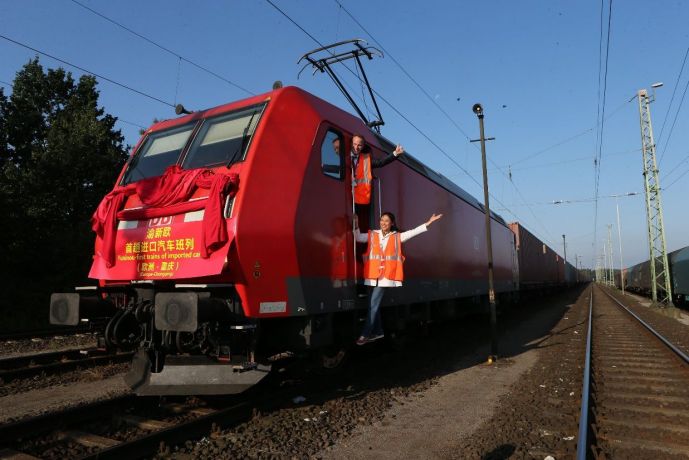
An inbound train carrying imported automobiles passes Hanover Station along the Chongqing-Xinjiang-Europe railway August 14, 2014. (Xinhua)
BEIJING, April 23 (Xinhua) -- Over the highland where the Rhine and the Ruhr meet stands Duisburg, a time-honored city. In ancient times, it was named Hellweg, connoting "the Bright Road". The city has embarked on a road of development since ancient Rome, and it emerged as a chemical engineering and metallurgical industrial center before the World War II. However, as the war drew to an end, the city saw a sharp decline in population, which caused a sharp decline in purchasing power. The city became less attractive to both consumers and enterprises, with "the Bright Road" getting dim gradually.
For several decades, Duisburg had been seeking for the right direction -- a journey of groping in the darkness. The Rhine, which has been running for thousands of years, witnessed the historical transformation in this city silently as a calm and wise lady without uttering any judgments, for it knew that every ups and downs comes with a reason. In 2011, Chongqing-Xinjiang-Europe railway was put into service. Trains from Chongqing, China began to travel across the continent towards Duisburg. From then on, the story about the ancient city and China Railway Express began. In the past eight years, the number of trains travelling from the Jialing River, a major tributary of the Yangtze River in Chongqing, to the Rhine has soared from zero. As an ancient cargo terminal and trading port, Duisburg is gathering new momentum for development.
Duisburg is one of the largest inland river ports and the most important transportation and logistics hub in Europe. The Rhine runs through Duisburg, so from here people can make for France, Switzerland in the south, and Holland, Belgium in the north. Meanwhile, it is a cross point of six expressways, making it possible for trucks to dispatch cargoes to other parts of Germany, and even the entire West Europe.
Here containers put on barges will be transported via the China Railway Express. Riverbanks are crowded with people, making it hard to hear one another unless one raises voice. As a station of China Railway Express in Europe, Duisburg Intermodal Terminal (DIT) is an important European distributing center, where several freight trains come and go each day. It is also the largest one among the nine terminals in the city, and is a major distributing center for rail containers in this area.
Before China Railway Express started operation there, DIT's annual profit was stagnating around 500,000 euros. After its launch in 2011, the figure tripled in 2017, a miracle indeed for Germany whose annual GDP growth was only 1.5 percent.
Johannes Pflug, Duisburg commissioner to Chinese affairs said that the throughput of the port increased by 30 percent in 2017, the fastest growth among all German ports. An important facilitating factor was China Railway Express, which has also created over 6,000 jobs in Duisburg and this number only represents the jobs in logistics.
"Statistics in recent years demonstrate that the Belt and Road Initiative has brought remarkable development and massive opportunities to Duisburg in the past few years," noted Soren Link, mayor of the city.
China Railway Express itself has also developed at an amazing speed. The express sent only seven or eight trains per week to DIT before, but now the number has leaped to around 30. Encouraged by the booming business, the terminal purchased another 200,000-square meter land and recruited more truck drivers.
Amelie Erxleben, a worker at DIT, said Chinese companies are now among the most important partners for DIT. Chongqing-Xinjiang-Europe Railway is a partner of the greatest significance, one that they have been cooperating with for the longest time. The company sends staff to visit Chongqing every year. Chongqing-Xinjiang-Europe Railway purchased a warehouse which is located within five minutes' travel to DIT. The two sides boast an intimate business relation.
Amelie is a young lady who just began to work in January 2018. Before that, she was a graduate student in the University of Duisburg-Essen, majoring in modern East Asian studies while working part-time at DIT. Like many other university students under employment pressure, Amelie also faced uncertainties when looking for a job.
Fortunately, she was offered a job related to international business development (Chinese market) at DIT thanks to her master's thesis titled A New Silk Road Connected by Freight Trains from China to Germany: A Substitute or Supplement to Flights and Ships. She has been working full-time for international business development since January 1, 2018. And her responsibilities include sales, market research and promotion, arrangement of business visits to China, reception of visiting Chinese business delegations at DIT and the company’s Spring Festival celebration in Duisburg. The most important job is to keep a close business relationship with Chinese partners.






